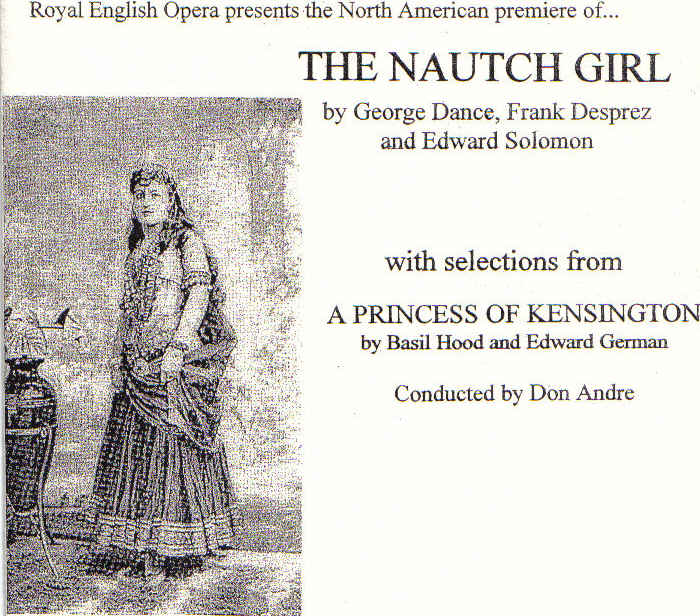Royal English Opera "Selections from A Princess of Kensington"
(presumed cast)
Kenna Madeline Herdamen
Puck Scott Farrell
Peaseblossom Susan Lewis
Nell Reddish Alexandrea Davis
William Jelf Jon Gustafson
Brook Green Robin Curtis
Robert Doonan
Oberon Joseph Anderson
Titania Marilyn Strong
Bill Blake Scott Farrell
Will Weatherly Joseph Anderson
Jem Johnson Robert Doonan
Piano June Taylor
Carolyn VanBlack
Conducted by Don Andre
When Royal English Opera gave their final performances in 2004, they had their first and last double-bill. The first show, Edward Solomon's Nautch Girl, was the most successful programme put on by the company. The second show was German's Princess of Kensington. Neither one being long enough to stand on its own, the two recordings were put together and released on one album. Of the ten songs that were recorded, only seven made the final cut for the album.
Scott Farrell writes, "I took some recordings of the songs we were to do on the programme in mid-July on my portable tape machine during rehearsals. I issued none of these, although I sorely wanted to, because there simply wasn't room on the disc. Nautch Girl took the bulk of the space, and I made an artistic decision.
We had previously recorded one song, 'Seven o'clock in the morning', with Robin Curtis, who had left the company in 2001, and Marilyn Strong. Strong's performance was less than acceptable, and I always wish that I had her layered onto the recording of the song so we could put [Madeline] Herdamen's voice in her place. The original was issued on the Opera Rarities series. I had considered that we cut it in half, but I decided against it. Back to the story, when I recorded stuff in 2004, it was pretty bleak, so I erased them. I made another take during the dress rehearsal week and got a couple more songs, which were not issued either. These were 'Fairies come forth' [sung by Susan Lewis] and 'Mortal King may ride' [by Anderson and Strong]. Neither one was particularly good, so I kept only Lewis' song and deleted them from the performances."
Royal English Opera recorded these songs, though not all were issued. Those not issued are marked with [*]:
"Fairies, come forth" (Lewis and Chorus) [*]
"Mortal King May Ride a-Horseback" (Anderson, Strong and Chorus) [*]
"If We Pass Beyond the Portals" (Farrell and Chorus)
"Twin Butterflies" (Herdamen)
"Seven o'clock in the Morning" (Curtis and Strong)[*]
"What is Woman's Duty?" (Davis)
"Tarantella" (the Northern Illinois University Clarinet Ensemble)
"By the Sea" (Chorus)
"Where Haven Lies" (Farrell [originally billed for Doonan] )
"Four Jolly Sailormen" (Gustafson and Men)
"Nature, Sound Thy Diapason" (Farrell, Herdamen and Chorus) [*]
Scott later added, "So many people have asked me why Doonan's name is in the programme, but my name appears on the album for 'Where Haven Lies'. So, once for all, Doonan came to me during the intermission on the first night and confessed that he didn't know the song. I remembered he had trouble with it at the dress rehearsal on the 5th, and when I asked him to sing a bit, he couldn't do it correctly. Rather than delete it at the last minute, I sang it in his place. I informed the audience of this change just before the song, which confused the hell out of Don [Andre], and we started the song. I must confess that the song is for a tenor and I am a bass-baritone, so this was a challenging number, with all its F-sharps and high Gs. Somehow I got through it without embarrassment, and we got to keep this beautiful aria on our programme."
The one curiosity of the selections is the Tarantella, performed by the NIU Clarinet Ensemble, which was not recorded with the rest of the selections. Its inclusion cannot be explained, but nevertheless, it provides a sample of German's favourite dance, with an interesting arrangement for clarinets and tambourine. Overall, it is a decent recording (a first for Royal English Opera) and it reveals only a few of the opera's charms. Clifton Coles had this to say about the selections:
The biggest surprise on the disc comes with the six [sic] selections..."Twin Butterflies" is a notoriously difficult number, a colaratura number akin to "Poor Wandering one" or "Neath my lattice" but considerably longer. As noted, Ms. Herdeman handles these difficulties gamely. The contralto aria "O what is woman's duty" is rendered beautifully by Alexandrea Davis, and tenor Rob Doonan conquers the challenges inherent in his act two aria -- even the choral number "By the sea" (another difficult number!) is nicely done... A listen to these songs reveals a too-long-neglected score."
Issue History
2004 Royal English Opera. Issued with Solomon's The Nautch Girl. Arm80 Studio.
